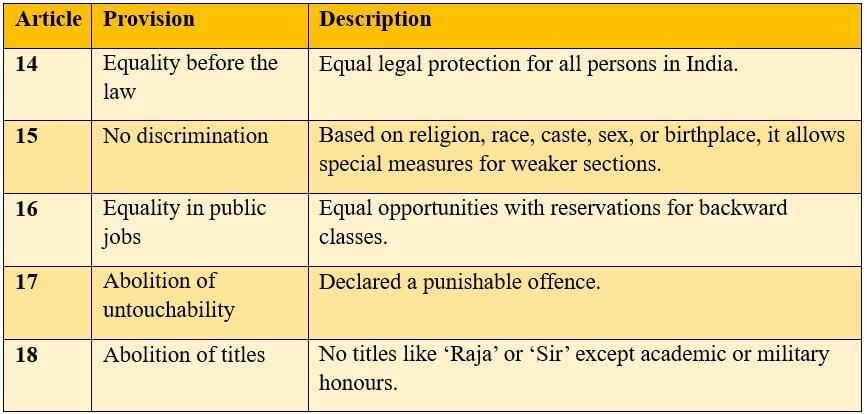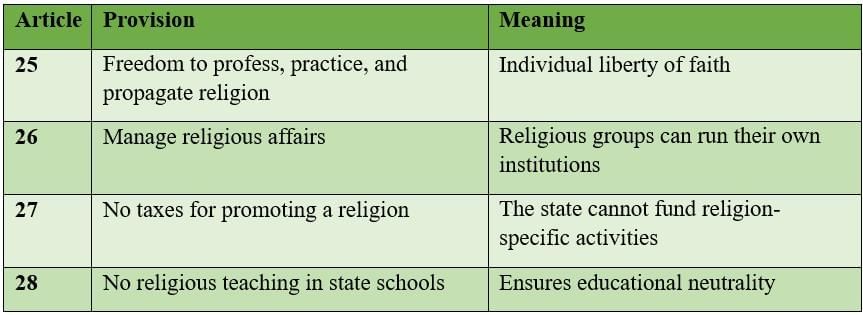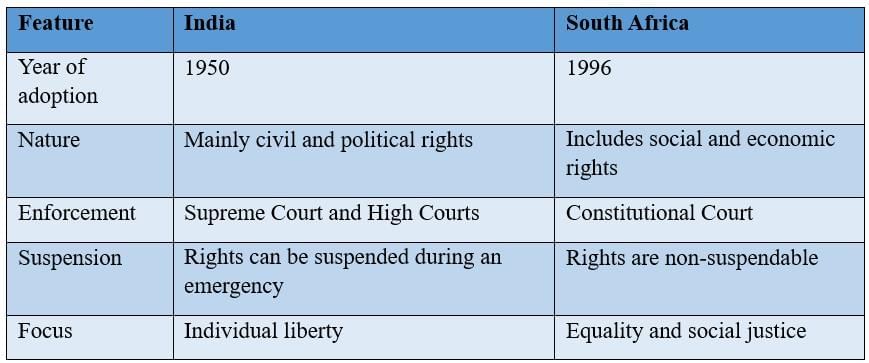Sure Shot Questions for Board Exams: Rights in the Indian Constitution | Political Science Class 11 - Humanities/Arts PDF Download
Introduction
This chapter focuses on the Fundamental Rights guaranteed by the Indian Constitution, their importance in protecting individual freedom and equality, and their role in ensuring justice and democratic governance. Below is a concise Q&A set to help you prepare for class tests, school exams, or board-level assessments with key, repetitive questions.
Key Questions
Q1. What are Fundamental Rights? Explain their key features as per the Indian Constitution.
 View Answer
View Answer 
Fundamental Rights are basic human entitlements guaranteed by the Constitution in Part III (Articles 12–35) to ensure individual dignity and democratic participation.
- They are justiciable, meaning enforceable by courts through writs under Article 32.
- Not absolute; subject to reasonable restrictions for public order, morality, or state security.
- Can be suspended during national emergencies (except Articles 20 and 21).
- Promote all-round citizen development and limit the government's arbitrary actions.
Q2. Why are Fundamental Rights considered essential for democracy in India?
 View Answer
View Answer 
Fundamental Rights protect citizens from state excesses, fostering equality and liberty vital for democratic governance.
- They ensure checks on executive, legislative, and judicial powers, preventing authoritarianism.
- Derived from the freedom struggle (e.g., Nehru Report, 1928), they embody values like justice and fraternity.
- The judiciary expands its scope through interpretations, as seen in the Asian Games Workers Case (1982), which enforced minimum wages.
- Without them, vulnerabilities like exploitation (e.g., Machal Lalung's 54-year detention) persist.
Q3. Describe the Right to Equality and its main provisions under Articles 14–18.
 View Answer
View Answer 
The Right to Equality (Articles 14–18) abolishes discrimination, ensuring uniform legal treatment and social justice.
Q4. What is the significance of Article 21 (Right to Life and Personal Liberty)? Give examples of its judicial expansion.
 View Answer
View Answer 
Article 21 states that no person shall be deprived of life or personal liberty except by a procedure established by law, interpreted broadly by courts to ensure a dignified living.
- Includes rights to livelihood, shelter, clean environment, and speedy trial.
- In Olga Tellis vs. Bombay Municipal Corporation (1985), the Supreme Court linked it to the right to work against arbitrary evictions.
- Expanded in Maneka Gandhi Case (1978) to require fairness and reasonableness in procedures.
- Protects against misuse of preventive detention, limited to three months without advisory board review.
Expanded Meaning (through court rulings):
- Right to live with dignity
- Right to livelihood and shelter (Olga Tellis, 1985)
- Right to a clean environment (MC Mehta, 1987)
- Right to privacy (K.S. Puttaswamy, 2017)
- Right to speedy trial (Hussainara Khatoon, 1979)
Thus, Article 21 covers not just life but also a dignified way of living.
Q5. Explain the freedoms guaranteed under Article 19 and the restrictions imposed on them.
 View Answer
View Answer 
Article 19 provides six important freedoms to citizens:
1. Freedom of speech and expression
2. Freedom to assemble peacefully
3. Freedom to form associations or unions
4. Freedom to move freely within India
5. Freedom to live in any part of India
6. Freedom to choose any profession or business
Restrictions:
These freedoms can be limited for reasons such as public order, morality, national security, decency, or friendly relations with other countries.
For example, hate speech or violent gatherings can be restricted to maintain peace.
Q6. How does the Right against Exploitation (Articles 23–24) address social injustices in India?
 View Answer
View Answer 
This right prohibits forced labour and child exploitation, targeting historical inequalities like bonded labour.
- Article 23: Bans human trafficking, begar (forced unpaid work), and bonded labour, punishable as a crime.
- Article 24: Forbids employment of children under 14 in hazardous industries like mines or factories.
- Linked to Directive Principles of State Policy (DPSP) for the uniform civil code and welfare, such exploitation persists in forms like rural debt bondage.
- Enforcement via the National Human Rights Commission (NHRC) and courts, e.g., petitions against caste-based scavenging.
Q7. Discuss the Right to Freedom of Religion (Articles 25–28) and its role in promoting secularism.
 View Answer
View Answer 
This right ensures religious liberty, balancing individual practice with state neutrality in a multi-faith society.
Upholds secularism by prohibiting forced conversions and ensuring equality across faiths.
Q8. What are Cultural and Educational Rights (Articles 29–30)? How do they protect minorities?
 View Answer
View Answer 
These rights safeguard minorities' linguistic, cultural, and educational identities in diverse India.
- Article 29: Protects the interests of minorities by language, script, or culture; no denial of admission to state-aided institutions on these grounds.
- Article 30: Right to establish and administer educational institutions, with state aid on equal terms.
- Example: Telugu-medium schools by Andhra societies outside the state preserve linguistic heritage.
- Prevents assimilation, allowing communities like Sikhs or Christians to maintain distinct identities.
Q9. Why is the Right to Constitutional Remedies (Article 32) called the 'heart and soul' of the Constitution?
 View Answer
View Answer 
Writs available under Article 32:
1. Habeas Corpus: To release a person from illegal detention.
2. Mandamus: To order a public official to perform his duty.
3. Prohibition & Certiorari: To stop or correct actions of lower courts.
4. Quo Warranto:To question the illegal occupation of public office.
- Bypasses lower courts for swift justice against state violations.
- Non-suspendable even in emergencies; e.g., used in Vishaka Guidelines (1997) for workplace harassment.
- Ensures other rights are meaningful by providing remedies.
Q10. Explain the relationship between Fundamental Rights and Directive Principles of State Policy (DPSP). Cite an example of conflict.
 View Answer
View Answer 
Fundamental Rights (justiciable, negative—limit state) complement DPSP (non-justiciable, positive—guide welfare for social justice).
- DPSP (Part IV) aims at economic democracy, e.g., equal pay (Art. 39), adequate livelihood.
- Harmony: Courts harmonize, as in the Minerva Mills Case (1980), deeming both part of the basic structure.

Example of conflict:
The property right earlier clashed with land reform laws (DPSP). It was later removed from Fundamental Rights by the 44th Amendment (1978).
Courts now try to balance both as essential parts of the Constitution.
Q11. What are Fundamental Duties? When and why were they added to the Constitution?
 View Answer
View Answer 
Fundamental Duties (Article 51A, Part IV-A) are 11 moral obligations for citizens to promote national unity and ethics.
- Added by the 42nd Amendment (1976) during the Emergency to counter rights' perceived misuse and instill responsibility.
- Include: Abide by the Constitution, protect the environment, promote harmony, and develop a scientific temper.
- Non-enforceable (no punishment for violation); inspired by the USSR Constitution.
- Do not override rights; e.g., the duty to defend the country complements liberty.
Q12. How has the judiciary expanded the scope of Fundamental Rights through interpretation? Give examples.
 View Answer
View Answer 
The judiciary has widened the meaning of Fundamental Rights to make them more effective:
- Right to Life (Article 21): Includes the right to dignity, livelihood, shelter, health, and a clean environment.
Example: Olga Tellis case (1985) – eviction of pavement dwellers without alternatives is illegal. - Right to Freedom of Speech (Article 19): Covers press, online expression, and academic freedom.
Example: Shreya Singhal case (2015) – struck down Section 66A of the IT Act. - Right to Constitutional Remedies (Article 32): Citizens can approach courts directly for rights violations.
Example: Kesavananda Bharati case (1973) – protected the “basic structure” of the Constitution. - Modern rights: Right to privacy and education are included under Article 21.
Example: Puttaswamy case (2017) – privacy recognized as a fundamental right.
Q13. Discuss violations of Fundamental Rights in the context of caste-based discrimination, with remedies.
 View Answer
View Answer 
Caste discrimination violates equality and dignity, as in forced scavenging or untouchability.
Examples of caste-based violations:
- A shopkeeper serving people differently based on caste, such as giving tea in a nice cup to one person while serving another in an earthen cup because of caste differences.
- Practices forcing Dalits or lower-caste communities to wash the feet of upper-caste members or perform degrading jobs during ceremonies.
Remedies under the Constitution and law:
- Articles 15 and 17: Prohibit caste-based discrimination and untouchability.
- Right to Constitutional Remedies (Article 32): Citizens can approach the Supreme Court or High Courts to enforce these rights. Courts can issue writs such as Habeas Corpus or Mandamus to protect citizens.
- National Human Rights Commission (NHRC): Investigates violations, especially when individuals face violence, harassment, or denial of rights.
- Government schemes and reservations: Seats in legislatures, jobs, and educational institutions are reserved for SC/ST communities to ensure representation and empowerment.
Q14. Compare the Indian Bill of Rights with South Africa's, highlighting justiciability.
 View Answer
View Answer 
India's Fundamental Rights (Part III) are justiciable, enforced via courts, but suspendable in emergencies.
Q15. In what situations can Fundamental Rights be restricted or suspended? Explain with reference to emergencies.
 View Answer
View Answer 
Fundamental Rights are not absolute; they can be restricted for public safety and national security.
Restrictions:
- Under Article 19, for public order, morality, or national security.
- Under Article 22, preventive detention allows temporary custody without trial.
Suspension:
- During a National Emergency (Article 352), most rights can be suspended.
- Articles 20 and 21 (protection of life and liberty) remain active even in emergencies.
Example: During the 1975 Emergency, many rights were suspended, which later led to reforms by the 44th Amendment.
Tips for Preparation
- Understand concepts clearly; avoid rote learning.
- Focus on frequently asked questions from past papers on Fundamental Rights, Directive Principles, and landmark cases.
- Memorize Key Articles (14–32) and important terms like Right to Equality, Right to Freedom, Right against Exploitation, and Right to Constitutional Remedies.
- Write answers in points for better clarity in long-answer questions.
- Revise with the NCERT textbook along with sample papers and previous year questions.
|
43 videos|278 docs|39 tests
|
FAQs on Sure Shot Questions for Board Exams: Rights in the Indian Constitution - Political Science Class 11 - Humanities/Arts
| 1. What are the key components to consider when preparing for board exams in Humanities/Arts? |  |
| 2. How can students manage their time effectively during board exam preparation? |  |
| 3. What are some common mistakes students make while preparing for Humanities/Arts exams? |  |
| 4. How important is it to practice previous years' exam papers for board exams? |  |
| 5. What role do group studies play in preparing for board exams in Humanities/Arts? |  |















